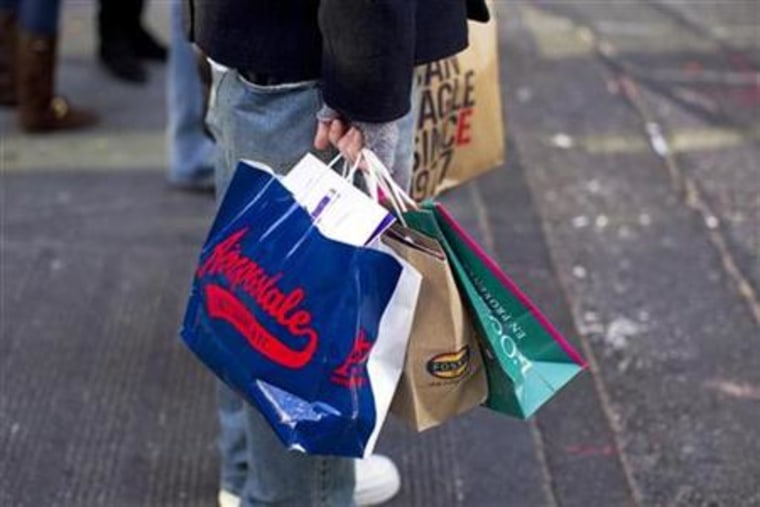As U.S. retailers get ready to box up their Christmas decorations after a better-than-expected holiday season, many shoppers plan to join them by putting their wallets back in storage.
Consumers hit stores in droves this year and are feeling better about their furtures. But they still confront bleak job prospects and still are trying to pay down their hefty debt loads.
That sets the stage for a "spending diet" come January, which could weigh on U.S. economic growth, since consumer spending accounts for 70 percent of the U.S. economy. If gasoline prices — back above $3 a gallon this week even before crude oil hit two-year year highs — continue to rise in 2011, the spending squeeze could be even steeper.
"At this point I refuse to put anything on credit. If I don't have the money, I don't buy it," said Jeff McErlain, a musician shopping at upscale department store Saks on Manhattan's Fifth Avenue on Wednesday.
He plans to remain thrifty in the coming months, a sentiment echoed by other U.S. consumers.
"I have to contain myself, because I am not working as much," said Abdiel Munoz, a New York-based freelance photographer.
The strong start to the holiday season in late November reflected pent-up demand after two weak Christmas seasons. Also, attractive deals lured in shoppers. It did not signal a return to frenzied spending, analysts and shoppers said.
"They put off purchases and they want to spend a little bit more," said Moody's Analytics chief economist Mark Zandi. But shoppers are not returning to the "high spending, high borrowing" seen during the boom, he said.
The result is likely to be pronounced lulls between the two major shopping seasons — back-to-school in late summer and the five weeks leading up to Christmas.
Consumer confidence certainly is improving. The University of Michigan's Consumer Sentiment Index for December reached its highest level in six months, and personal income edged upward in October and November, supporting the fifth straight monthly gain in U.S. consumer spending, according to data released on Thursday.
But an unemployment rate at 9.8 percent and roughly 15 million Americans out of work, not to mention millions more working part-time who would prefer a full-time job, bodes ill for a robust recovery in spending.
Consumers for 24 months in a row have been paying down mortgage and other debt, which reached record levels before the 2007-2008 recession.
By the end of September, they had paid off $922 billion in debt since the third quarter of 2008, but they still have $11.6 trillion outstanding, according to the New York Federal Reserve. This was money that previously had supported consumer-driven growth.
Top U.S. retailers this month reported that November sales at stores in business for at least one year rose by 6 percent from the same month a year ago, far above the 3.6 percent forecast. The robust sales have lifted consumer stocks this year. The S&P Retail Index hit a 3 1/2 year high in early December and has rallied 24.7 percent in 2010, almost twice the pace of overall gains in the Standard and Poor's 500 Index.
Wall Street analysts are expecting December comparable sales to be a little more muted, up 3.6 percent led by discounters and department stores, according to Thomson Reuters.
J.C. Penney Co Inc is one of the retailers aggressively courting consumers. It has kept up a steady pace of promotions and ramped up mobile applications that help shoppers download coupons remotely. It has even run out of items such as its popular St. John's Bay cashmere-blend women's pea coats at some stores.
"Price is still very important, but at the same time we're seeing them look for more exciting gifts," said Liz Sweney, Penney's co-chief merchant.
Penney's strategy has proven effective. A survey done last week by America's Research Group and UBS found Penney saw a big rise in visits from shoppers, while Wal-Mart Stores Inc faltered.
The National Retail Federation recently raised its outlook for holiday sales by 1 percentage point to a gain of 3.3 percent from a year ago.
But that would still leave retail sales at $451.4 billion during November and December, not quite back to the $452.8 billion level in 2007, before the financial market meltdown.
"When jobs come back, that's when spending comes back," said FBR Capital Markets analyst Liz Dunn.
The season's fast start was propelled by deals and heavy promotions that experts say will remain a fixture in 2011.
"The consumer has been trained to expect that a great deal is coming, so there's no need to buy today," said David Bassuk, who leads AlixPartners' global retail practice.
Many investors are betting on both the high and low end of the retail spectrum this year, seeing that the American consumer is feeling a little more confident but still needs a bargain.
Luxury companies such as Coach Inc and Tiffany & Co which never slashed prices will have an easier time in 2011, analysts said.
Off-price retailers TJX Cos Inc and Ross Stores and their competitors will also continue to do well. "Shoppers still want brand names, they just want them at a low price," said Nomura Securities analyst Paul Lejuez.
U.S. savings as a percentage of disposable income continues well above 5 percent, compared with the sub-2 percent savings rate in 2005, when Americans were tapping home equity loans to go shop. That rate is in line with levels in the 1990s before the credit explosion.
U.S. families have paid down a lot of their household debt. J.P. Morgan analyst Michael Feroli said in a note to clients on Friday, but warned that that "will continue for many years."
Sherriae Saunders, a homemaker shopping at a Penney store in New York, said paying down debt is an "absolute priority" in 2011.
